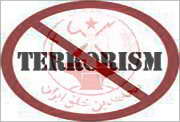
Following warnings and intelligence that the Mojahedin Khalq had planned to stage an incident in Geneva aimed at disrupting the talks, Swiss police took timely action yesterday to prevent just such an action. Members of the Mojahedin Khalq expelled from Camp Ashraf in Iraq – the MEK’s former terrorist training camp – and now based in Switzerland had wanted to disrupt press conferences held by EU High Representative Catherine Ashton and Iranian Foreign Minister Mohammad Javad Zarif. Officials at the venue in Geneva reported that police had prevented this.
The failure of the MEK to have any presence at Geneva, as they have done in the past by staging aggressive pickets and protests, is seen by many to indicate that even their most ardent backers have acknowledged that the MEK’s deeply unpopular and staged antics are counter-productive, and have been forced to curtail their activities.
Experts in MEK behaviour however, believe this could trigger rogue activity and continue to advise western security services to maintain vigilance over the group’s members. Operating as a cult, the MEK leaders depend on retaining members through priming them for and involving them in specific activities which include aggression and acts of violence. Although the MEK’s backers have until now taken advantage of this extremism, albeit at arm’s length, as a tool in their armoury of efforts to confront Iran, the MEK are now being treated as a liability rather than an effective instrument. Without informed understanding of MEK behaviour and beliefs and without oversight over MEK activity the group could slip into desperation and order acts of rogue violence. In particular, MEK leaders could order another series of random violent attacks on former members living in Europe, or another violent incident in Iraq.



